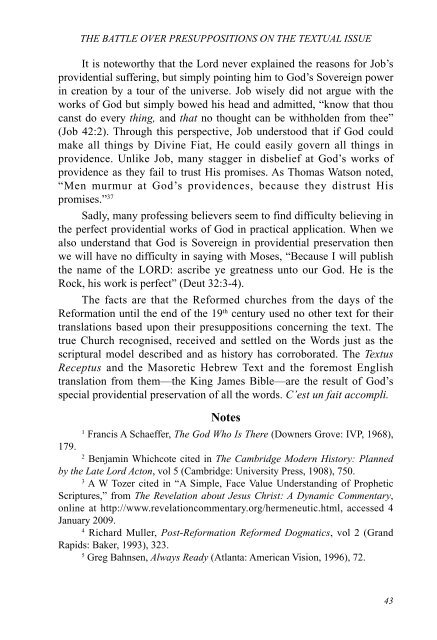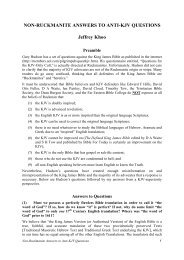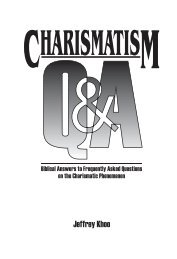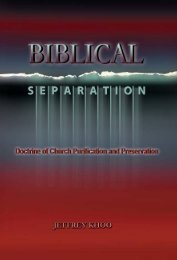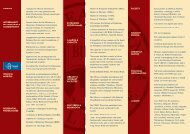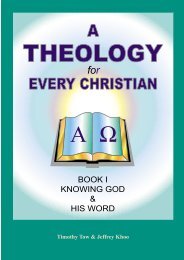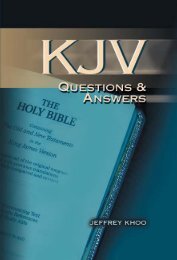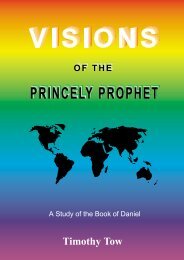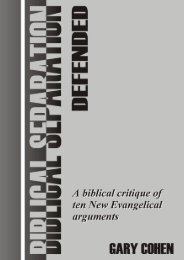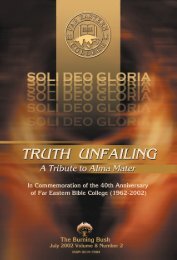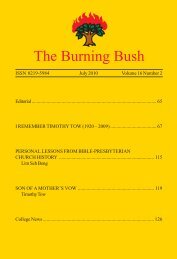The Burning Bush - Far Eastern Bible College
The Burning Bush - Far Eastern Bible College
The Burning Bush - Far Eastern Bible College
Create successful ePaper yourself
Turn your PDF publications into a flip-book with our unique Google optimized e-Paper software.
THE BATTLE OVER PRESUPPOSITIONS ON THE TEXTUAL ISSUEIt is noteworthy that the Lord never explained the reasons for Job’sprovidential suffering, but simply pointing him to God’s Sovereign powerin creation by a tour of the universe. Job wisely did not argue with theworks of God but simply bowed his head and admitted, “know that thoucanst do every thing, and that no thought can be withholden from thee”(Job 42:2). Through this perspective, Job understood that if God couldmake all things by Divine Fiat, He could easily govern all things inprovidence. Unlike Job, many stagger in disbelief at God’s works ofprovidence as they fail to trust His promises. As Thomas Watson noted,“Men murmur at God’s providences, because they distrust Hispromises.” 37Sadly, many professing believers seem to find difficulty believing inthe perfect providential works of God in practical application. When wealso understand that God is Sovereign in providential preservation thenwe will have no difficulty in saying with Moses, “Because I will publishthe name of the LORD: ascribe ye greatness unto our God. He is theRock, his work is perfect” (Deut 32:3-4).<strong>The</strong> facts are that the Reformed churches from the days of theReformation until the end of the 19 th century used no other text for theirtranslations based upon their presuppositions concerning the text. <strong>The</strong>true Church recognised, received and settled on the Words just as thescriptural model described and as history has corroborated. <strong>The</strong> TextusReceptus and the Masoretic Hebrew Text and the foremost Englishtranslation from them—the King James <strong>Bible</strong>—are the result of God’sspecial providential preservation of all the words. C’est un fait accompli.Notes1Francis A Schaeffer, <strong>The</strong> God Who Is <strong>The</strong>re (Downers Grove: IVP, 1968),179.2Benjamin Whichcote cited in <strong>The</strong> Cambridge Modern History: Plannedby the Late Lord Acton, vol 5 (Cambridge: University Press, 1908), 750.3A W Tozer cited in “A Simple, Face Value Understanding of PropheticScriptures,” from <strong>The</strong> Revelation about Jesus Christ: A Dynamic Commentary,online at http://www.revelationcommentary.org/hermeneutic.html, accessed 4January 2009.4Richard Muller, Post-Reformation Reformed Dogmatics, vol 2 (GrandRapids: Baker, 1993), 323.5Greg Bahnsen, Always Ready (Atlanta: American Vision, 1996), 72.43


